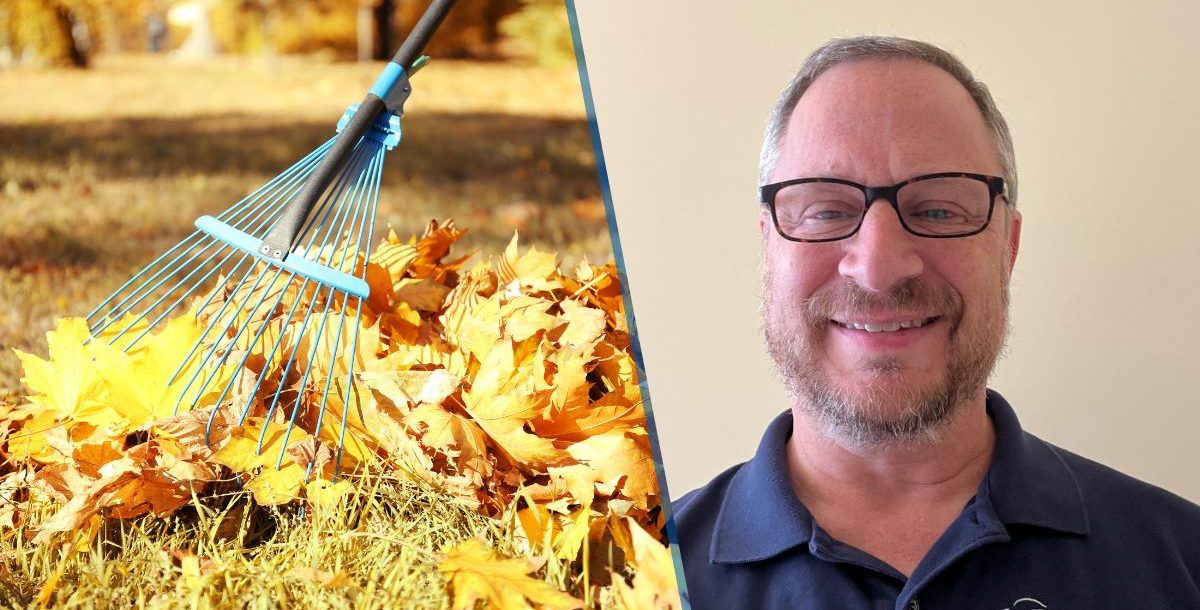Summer is the most common time of the year for emergency room visits, but the fall months present their own set of safety challenges. However, one of our physicians has some fall yardwork safety tips to keep you out of the hospital.
“We see injuries daily, and it’s not just slips and falls, but it’s cuts, it’s bumps, it’s bruises, it’s broken bones,” Jay Taylor, MD, one of our emergency room physicians based in our Toledo market, shares.
Between sticks, cluttered gutters and piles of leaves, there are plenty of reasons to spend some time in your yard this fall season. Yardwork can be fun and fulfilling. It’s also a great way to get a little extra exercise in. However, it can also be dangerous. Prepare ahead of time to stay safe!
Prepare the tools you’ll use
Before you pick up a power tool or start your lawn mower, familiarize yourself with how it works. Read the owner’s manual, or if you don’t have one, check online. You should know what the different switches do, when to change to a different mode and how to maintain each tool between uses.
If a tool has a cord, scope the cord out for any signs of damage. Make sure everything’s switched off before plugging it in. Also, be sure to set ladders on level surfaces and don’t dig anywhere on your property before checking for possible buried utilities.
Warm up your muscles
You wouldn’t exercise without warming up first and doing a cooldown afterward, right? You should approach yardwork with the same level of seriousness.
Muscle pain is one of the most common injuries people seek emergency care for after fall yardwork. Strain in the shoulders, back and neck muscles is easily caused by repetitive bending, twisting and pulling that raking can cause.
Take a few minutes to stretch out and warm up before getting started. Also, once you start your yardwork, it helps to switch up your activities every half hour or so to avoid overworking any one part of your body.
Stay hydrated even if it’s not a hot day, because you can still get dehydrated fast. And it’s critical to listen to your body. If anything hurts, take a break.
Scope out your space
Wind and rain can leave dangerous debris scattered over your lawn, landscaping beds, walkways and other areas. Mowing over sticks and rocks, for example, can send them flying into the air.
Plus, disturbing leaves, whether in gutters or piles, sometimes means upsetting critters going about their business, like bees and other insects or animals.
Dr. Taylor notes that when raking leaves with frost on them, “understand that that is going to be slippery and take precautions so that you are setting yourself up not to fall.”
So, before getting started, walk your yard and pick up anything that could be in your way. While you’re at it, take any children and pets indoors to keep them safe while you’re working.
Dress for success
This next important fall yardwork safety tip may seem obvious but is often overlooked. What you wear can either protect you or leave you more vulnerable to getting hurt.
First and most important, wearing proper shoes is critical when it comes to protecting your feet and avoiding falls.
“If slipping on a wet pile of leaves leads to a hip fracture, it can significantly impact your health, not just for the near future but potentially always,” Dr. Taylor warns.
Other key protective gear includes:
- Pants and long sleeves to protect your skin
- Hearing protection to guard your ears from prolonged exposure to loud equipment
- Goggles or safety glasses to protect your eyes from flying debris as you work
- Gloves that fit well to protect your hands from exposure to chemicals or pricks from barbs and thorns, as well as poison ivy
Make sure you’re awake and alert
Another yardwork safety tip is to avoid using alcohol or medications that might impair your judgment before you start working. Being mindful of what you’re doing is very important, especially if you’re working with power tools or anything with a sharp blade.
“The biggest thing with fall yardwork injuries, or just injuries in general like this, is to be smart and use whatever precautions that you can use to minimize your risk,” Dr. Taylor says.
Preventing injuries during yardwork isn’t always possible. After all, accidents are just that — accidents. If something happens, our experts are here to treat your injury and get you back to working outdoors.
Learn more about the primary care services as well as emergency care services we provide at Mercy Health.






